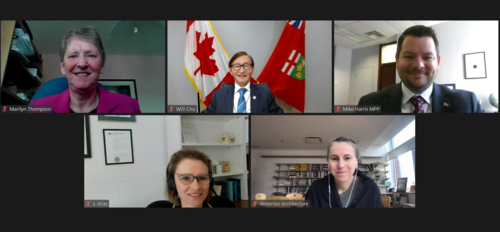
| From left to right: Marilyn Thompson, Associate Provost, Human Resources (emcee for the announcement); Minister Raymond Cho (Minister of Seniors and Accessibility); local MPP Mike Harris; Stepanka Elias, Executive Director, Plant Operations; Anne Bordeleau, O’Donovan Director, School of Architecture |
|---|
Yesterday the Ontario government announced a $400,000 investment through its EnAbling Change Program, which promotes education and awareness about increasing accessibility and inclusivity in academia and building design. The 14 chosen projects will assist people with disabilities, seniors, and other marginalized communities during and beyond COVID-19, making Ontario more accessible to people of all abilities.
Two projects from Waterloo were each awarded over $100,000 through the program, and will be topped up with university contributions.
University of Waterloo is receiving up to $112,461 for its project to better integrate universal design standards into student learning at Canadian University Schools of Architecture.
“The University of Waterloo has always been known for excellence in innovation, and I’m very pleased the Ontario Government is supporting projects that will inform future design strategy and teaching tools for better, more accessible, and inclusive spaces,” said Mike Harris, Member of Provincial Parliament for Kitchener-Conestoga. “As our understanding of accessibility needs grows, so should our response to addressing those needs, and this funding will ensure that design standards evolve to support our changing communities.”
The Inclusive Physical Space Design Strategy: partnershipbetween Plant Operations, APHR-Accessibility, Sustainability, and Campus Wellness. The Inclusive Physical Space Design Strategy will develop an outcome-based design strategy for campus buildings that encompasses all three areas.
The Accessibility in the Built Environment: collaboration with the Canadian Council of University Schools of Architecture (12 schools, with project to be led by Waterloo’s School of Architecture). Accessibility in the Built Environment will develop:
- Learning and teaching tools to integrate universal design standards as part of curriculum;
- Accessibility assessment tools for different architecture education spaces (such as design studio, fabrication labs, and computational tools); and
- Materials, guidelines to integrate UD standards across a variety of domestic, civic, and institutional spaces to promote creation of inclusive environments